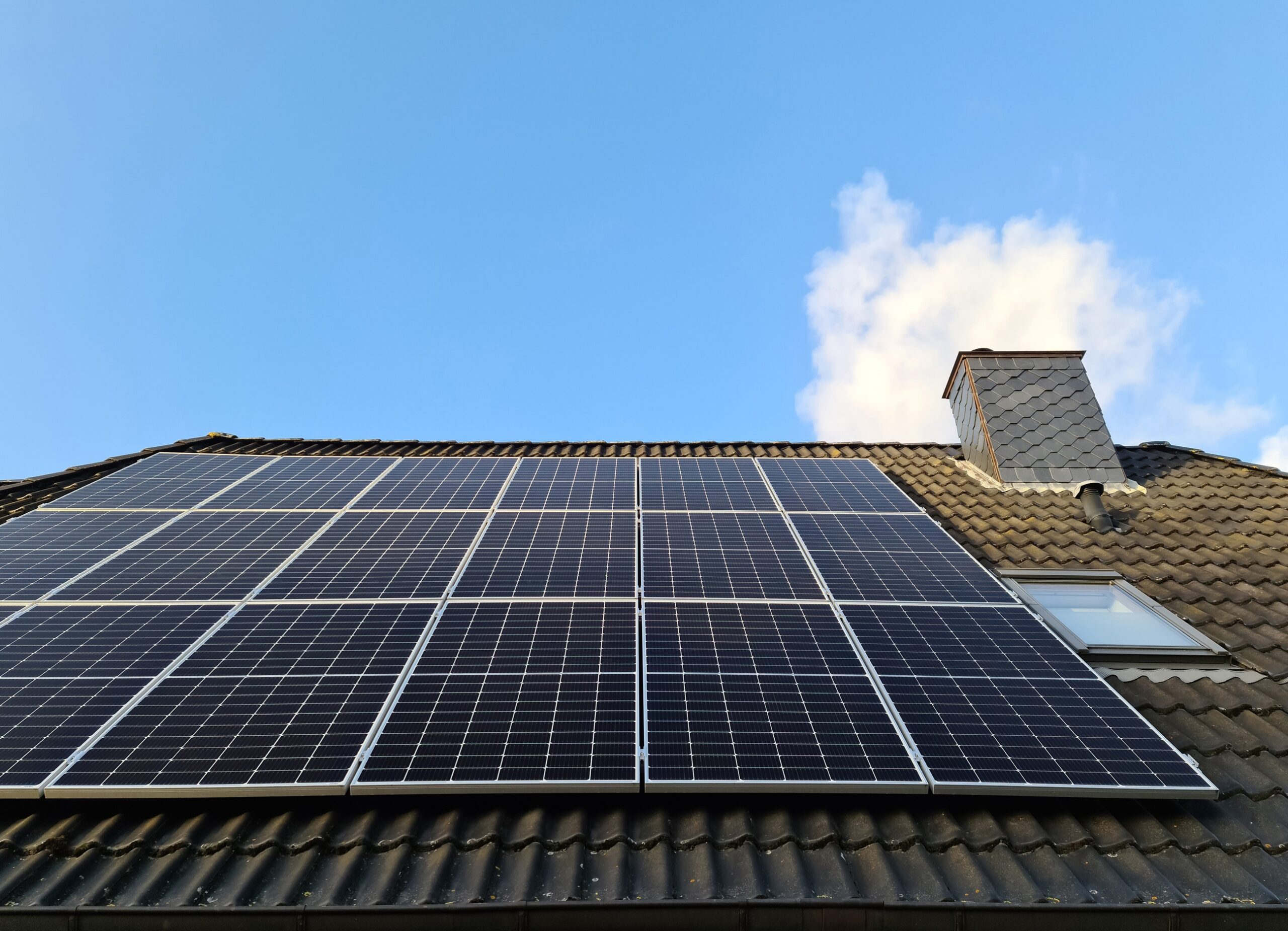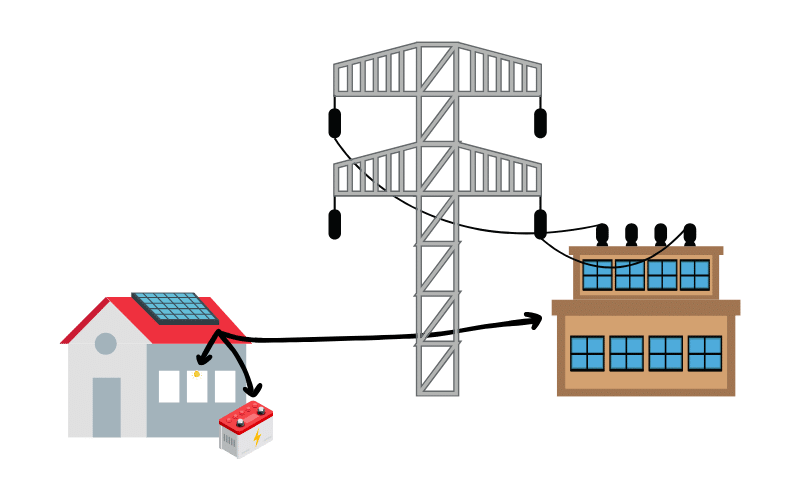
How much you can save and earn with solar panels
The ability of solar panels to convert sunlight directly into electricity is the key factor in their cost-saving potential. Depending on the size of your solar system, you could significantly cut, your electricity bills. Over the long term, this can result in substantial savings, making the initial cost of installation a worthy investment.
How does generating energy with Solar Panels Work?
Solar panels, or photovoltaic panels, operate on a simple scientific principle known as the “photovoltaic effect”. When sunlight hits the panels, it energises the semiconductor material (commonly silicon). This energy knocks electrons loose, allowing them to flow freely. These moving electrons are harnessed as electric current, which can then be used to power your home.
During the sunlit hours, your solar panel system may generate more electricity than you use. In this case, the surplus energy is not wasted. Instead, it can be stored in an optional solar battery for use during the night or overcast days. This stored energy can supply electricity when solar power generation is low or non-existent, ensuring a consistent power supply.

Smart Export Guarantee (SEG)
Any excess electricity your solar panels generate can also be exported back to the national grid. Several energy suppliers offer a scheme known as the ‘Smart Export Guarantee‘ (SEG), where they pay you for the electricity you export. This allows you to make the most out of your solar panel system, reducing your energy costs and contributing to a greener grid.
What is the Smart Export Guarantee (SEG) Tariff?
The Smart Export Guarantee offers a straightforward way for homeowners to earn money by exporting surplus electricity generated by their solar panels. Under this scheme, you receive a flat rate payment for each kilowatt-hour (kWh) of electricity exported back to the grid. This means not only saving on energy costs but also turning your home into a mini power station contributing to a sustainable future.
Who is the SEG Best For?
The SEG is best suited for those who have solar panels and wish to maximise their investment by earning additional income from unused energy. It’s particularly advantageous for homeowners who prefer to retain their existing import electricity supplier while still benefiting from the SEG with a different provider. This flexibility makes it an appealing option for many, allowing for seamless integration with your current energy setup.
How many solar panels do you need?
While it is possible to work this out yourself, getting it absolutely perfect can be intricate. Why not save your time and effort? Please leave it to the experts, who are more than willing to provide this information for free as part of a no-obligation quote. Please take action today and let us assist you in the best possible way!
If you think you can do it, here’s a general guide below:
1. Work out your annual electricity usage
To determine your energy usage, you should begin by carefully reviewing your most recent energy bill. Look closely for a dedicated section stating “Electricity Usage” or “Consumption”. Typically, this information will be measured in kilowatt-hours (kWh), the standard unit of electricity. Your usage might be broken down monthly, quarterly, or even yearly. However, for the next step, you will specifically need this data every year.
2. Decide the wattage of solar panels to use
To determine the size of the solar panel system, you may need an average annual energy consumption of 4,800 kWh; you can use the following formula: System Size (in kilowatts, kW) = 4,800 kWh ÷ (365 days/year × Average Daily Sunlight Hours × Solar Panel Efficiency)
So, for an average annual energy consumption of 4,800 kWh with 5 hours of daily sunlight and 15% efficient solar panels, you would need approximately a 5.26 kW solar panel system to meet your energy needs.
3. Measure how many solar panels you can fit on your roof
The average size per panel will be around 1.6m x 1m, depending on size, make and model; you can use this to assess your roof’s available space. This can be done with a tape measure or specialist measurement tools; it’s a more complex task than it first appears. Your roof’s orientation and the nature of sunlight exposure it receives play a vital role in optimising your solar panels’ efficiency. Typically, for the UK, only south, east, and west-facing roofs are suitable for solar panel installation, with the south being the most effective.
Try our calculator to determine the size of the solar system you need.
Remember, you’ll still need to determine if the system fits your property.
Some Frequently Asked Questions About Savings & Earnings from Solar Panels
Is it worth getting solar panels?
Installing solar panels in the UK is a worthwhile investment. Not only do they significantly reduce energy bills, but they also meet a home’s electricity needs. Moreover, solar energy is renewable and contributes to the reduction of carbon emissions. Additionally, properties with solar panels are highly sought after in the UK real estate market. Furthermore, the government’s Smart Export Guarantee (SEG) scheme allows homeowners to sell excess solar electricity back to the grid, creating an additional income stream. With energy cost savings, environmental benefits, enhanced property values, and potential earnings, solar panels are valuable additions to any UK home.
However, it’s important to consider the factors that influence the costs and savings of solar power for individual households.
Here are some key elements to keep in mind:
Tariff Plans: The electricity tariff you are on can greatly affect your savings. Different plans offer varying rates, which can impact the financial benefits of solar energy.
Number of Solar Panels: The size and number of panels installed are crucial. More panels might lead to greater energy generation but also increase the initial investment.
Energy Usage and Timing: Your household’s energy consumption patterns—how much and when you use electricity—play a significant role. Homes that use more energy during daylight can maximize their solar savings.
Battery Storage Options: Incorporating a battery can enhance savings by storing excess energy for use during non-sunny periods, making your solar system more efficient.
Household Size and Average Usage: Savings can also depend on the average energy usage of your household. For instance, typical medium-sized households might see different results based on their unique consumption habits.
By understanding and evaluating these factors, homeowners can make informed decisions to optimize their solar installations, ensuring maximum financial and environmental returns.
Do solar panels save money?
Solar panels offer long-term cost savings. In the UK, they generate a significant amount of home electricity, reducing reliance on the grid and lowering energy bills. Storing excess solar energy with a battery system further maximises these savings. Furthermore, the Smart Export Guarantee (SEG) scheme allows homeowners to sell excess electricity back to the grid, providing an additional source of income. Despite the initial investment, solar panels are a highly cost-effective option for homeowners in the UK.
Understanding Cost and Savings Calculations
Total Annual Consumption and Generation
For a typical property, let’s assume a setup with 10 solar panels, each rated at 440W, producing an estimated 4,400kWh annually. This generation significantly offsets the average annual consumption, which ranges between 3,500 – 3,999 kWh.
Self-Consumption and Exporting Surplus
Without Battery Storage: About 22% of this generated energy is consumed directly by the household. This means 968kWh is used on-site, while the remaining 3,432kWh is exported back to the grid.
With Battery Storage: A battery setup can increase self-consumption to 54%, utilizing approximately 2,376kWh on-site and exporting 2,024kWh.
Calculating Electricity Costs
Without Solar Panels: The annual electricity bill could reach around £1,080.
With Solar Panels (No Battery): Importing the remaining 2,532kWh from the grid, after accounting for self-consumption, results in a reduced bill of approximately £328, yielding a 70% saving.
With Solar Panels and Battery: The household imports only 1,124kWh, cutting the annual bill down to about £194, achieving an 82% saving.
Impact of Tariff Rates
When considering different tariff structures, such as day and night rates, these calculations adapt to the specific rates available. For instance, weighted averages based on consumption patterns can further decrease costs, potentially lowering the bill to £120 with an 89% saving.
Conclusion
By integrating solar panels, and potentially a battery storage system, homeowners can dramatically reduce their electricity costs. Through strategic use of self-consumption and exporting surplus electricity, the savings are not just significant—they are transformative, offering both financial and environmental benefits.
Which solar panels are the best?
Choosing the best solar panels depends on several factors, such as budget, roof space, and energy needs. In terms of efficiency, durability, and warranties, SunPower, LG, and Panasonic are among the top manufacturers. It’s important to consider the cost per watt and energy production based on your location. Additionally, exploring different types of panels, such as monocrystalline, polycrystalline, and thin-film, can provide distinct advantages. While monocrystalline panels are highly efficient, they tend to be pricier. On the other hand, thin-film panels are less expensive but require more space. For tailored solutions, it’s recommended to consult with a certified solar installer. Ultimately, the best solar panels are the ones that meet your requirements, offer reliable performance, and provide value for your investment.
How is your electric bill affected after installing Solar panels?
By installing solar panels, you can greatly reduce your electricity bill. These panels generate a portion of your power, resulting in significant savings. The amount you save depends on factors such as panel size, energy consumption, and sunlight exposure. Additionally, a solar battery can store excess energy, providing backup power during cloudy days or at night and reducing reliance on the grid.
In the UK, there’s an opportunity to earn money through the Smart Export Guarantee (SEG) by selling surplus energy back to the grid. After the installation, make sure to inform your energy supplier and apply for SEG. This way, you can maximise the benefits of your solar panel system.
